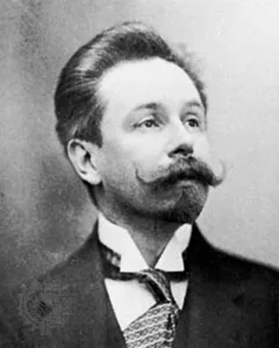
To listen to today’s reflection as a podcast, click here
There has never been a shortage of utopian dreamers – individuals who believe they hold the key to humanity’s ultimate happiness.
One of them was Alexander Scriabin, a Russian musician who became convinced he had been chosen to write a masterwork that would usher in the very end of history.
Born in 1872, Scriabin quickly established himself as a prodigy. His piano compositions were likened to those of Frederick Chopin. Over time, however, he became obsessed with the notion that the time had come for an entirely new artistic language.
And he was just the artist to conjure it up.
In 1903, he began composition of a multi-dimensional experience called the Mysterium. Every aspect of human sensation would be in play – not only sights and sounds, but tastes, smells, and touch.
The performance would not be your typical two or three-hour affair at the concert hall, followed by a late dinner. The Russian imagined a completely immersive experience that would last for up to a week. He wrote:
“There will not be a single spectator. All will be participants. The work requires special people, special artists and a completely new culture. The cast of performers includes an orchestra, a large mixed choir, an instrument with visual effects, dancers, a procession, incense, and rhythmic textural articulation. The cathedral in which it will take place will not be of one single type of stone but will continually change with the atmosphere and motion of the Mysterium. This will be done with the aid of mists and lights, which will modify the architectural contours.”
In Scriabin’s mind, this unique cathedral would be built in the Himalayan foothills of northern India – a semicircular temple surrounded by bells.
But the most audacious aspect of his vision was what would happen at the end.
Everyone present would “suffocate from pure happiness and pass into a new dimension.” Scriabin intended his masterpiece to accomplish the transformation of the human race into “nobler beings.” He suspected the entire universe might implode.
And you thought the Beatles were under pressure to come up with something amazing after “Sergeant Pepper’s Lonely Hearts Club Band.”
By 1915, after laboring for a dozen years, Scriabin had sketched out 72 pages of a prelude to the Myterium. Unfortunately, he overlooked a festering boil on his lip. Infection set in. Scriabin died of blood poisoning at the age of 43.
As his beloved Russia descended into the darkness of World War I and the chaos of Lenin’s Revolution, the visionary composer was almost forgotten.
Almost. A Soviet musician named Alexander Nemtin devoted 28 years of his life to finishing at least a part of what had been started. Relying on Scriabin’s notes and bits and pieces from other compositions, Nemtin created a trimmed-down, two-and-a-half hour version of the Mysterium.
Are you dying to know what it sounds like – this piece that was intended to precipitate a joyful Apocalypse?
Here’s a concert recording: Alexander Scriabin (compl. Alexander Nemtin): Preparation for the Final Mystery [Tabachnik/NNO]. If you jump around a bit, you can get a sense of Scriabin’s style – and you might be reminded of the last two or three science fiction movies you’ve seen.
Scriabin’s dream of a history-changing experience never became reality.
Nor has the world embraced the first condition of his vision: “There will not be a single spectator. All will be participants.”
Most of us are content to be spectators. We watch. We wait. We cheer for others. We keep our distance, and may even be secretly glad that God has called others to do life’s heavy lifting.
Author John Maxwell notes that most churches bear an eerie resemblance to football games.
The vast majority of those present are sitting in the stands. What are they doing? They’re “watching 22 other guys knock their brains out on the field.”
In the real world, of course, being in the company of God’s people is not a spectator sport. According to Paul’s first letter to the church at Corinth, everybody is called to be on the field. The Holy Spirit is no respecter of persons: Every disciple gets the ball (I Corinthians 12:12-29).
But there’s more:
Since we’re called and equipped to be the hands and feet of Jesus, every disciple is also expected to run with the ball – to leave the sidelines and get into the game.
At least one Russian composer believed that audience participation would help bring about utopia.
While the odds of that don’t seem to be very high, we have God’s assurance that something else will most certainly happen.
The kingdom of God will move another step forward.
